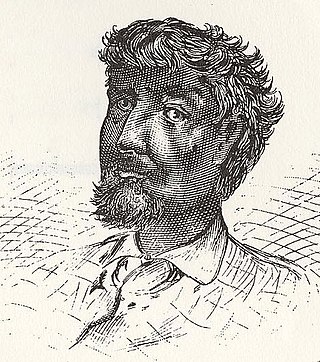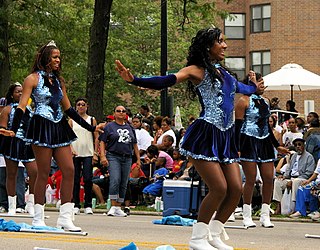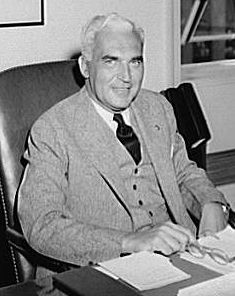Related Research Articles

Jean Baptiste Point du Sable is regarded as the first permanent non-Indigenous settler of what would later become Chicago, Illinois, and is recognized as the "Founder of Chicago". A school, museum, harbor, park, bridge, road, have been named in his honor. The site where he settled near the mouth of the Chicago River around the 1780s is identified as a National Historic Landmark, now located in Pioneer Court.

Washington Park is a community area on the South Side of Chicago which includes the 372 acre (1.5 km2) park of the same name, stretching east-west from Cottage Grove Avenue to the Dan Ryan Expressway, and north-south from 51st Street to 63rd. It is home to the DuSable Museum of African American History. The park was the proposed site of the Olympic Stadium and the Olympic Aquatics Center in Chicago's bid to host the 2016 Summer Olympics.

Lorado Zadok Taft was an American sculptor, writer and educator. His 1903 book, The History of American Sculpture, was the first survey of the subject and stood for decades as the standard reference. He has been credited with helping to advance the status of women as sculptors.

Douglas, on the South Side of Chicago, Illinois, is one of Chicago's 77 community areas. The neighborhood is named for Stephen A. Douglas, Illinois politician and Abraham Lincoln's political foe, whose estate included a tract of land given to the federal government. This tract later was developed for use as the Civil War Union training and prison camp, Camp Douglas, located in what is now the eastern portion of the Douglas neighborhood. Douglas gave that part of his estate at Cottage Grove and 35th to the Old University of Chicago. The Chicago 2016 Olympic bid planned for the Olympic Village to be constructed on a 37-acre (15 ha) truck parking lot, south of McCormick Place, that is mostly in the Douglas community area and partly in the Near South Side.

Paul Vories McNutt was an American diplomat and politician who served as the 34th governor of Indiana, high commissioner to the Philippines, administrator of the Federal Security Agency, chairman of the War Manpower Commission and ambassador to the Philippines.

The history of African Americans in Chicago or Black Chicagoans dates back to Jean Baptiste Point du Sable’s trading activities in the 1780s. Du Sable, the city's founder, was Haitian of African and French descent. Fugitive slaves and freedmen established the city's first black community in the 1840s. By the late 19th century, the first black person had been elected to office.

The DuSable Black History Museum and Education Center, formerly the DuSable Museum of African American History, is a museum in Chicago that is dedicated to the study and conservation of African-American history, culture, and art. It was founded in 1961 by Margaret Taylor-Burroughs, her husband Charles Burroughs, Gerard Lew, Eugene Feldman, Bernard Goss, Marian M. Hadley, and others. They established the museum to celebrate black culture, at the time overlooked by most museums and academic establishments. The museum has an affiliation with the Smithsonian Institution.

Jesse Binga was a prominent American businessman who founded the first privately owned African-American bank in Chicago. Binga recalled coming to Chicago in the 1890s with $10 in his pocket. By the 1920s he was a bank president and major real estate owner. Unwilling to conform to de facto, private real-estate segregation, white real estate interests sometimes opposed him violently. After his bank failed in the Great Depression, Binga was eventually charged with embezzlement, a controversial prosecution in the African American community. Protests and public petitions helped lead to his early release. He was granted a full pardon in 1941.

John Gibbs St. Clair Drake was an African-American sociologist and anthropologist whose scholarship and activism led him to document much of the social turmoil of the 1960s, establish some of the first Black Studies programs in American universities, and contribute to the independence movement in Ghana. Drake often wrote about challenges and achievements in race relations as a result of his extensive research.
Henry Glassie College Professor Emeritus at Indiana University Bloomington, has done fieldwork on five continents and written books on the full range of folkloristic interest, from drama, song, and story to craft, art, and architecture. Three of his books -- Passing the Time in Ballymenone, The Spirit of Folk Art, and Turkish Traditional Art Today -- were named among the "Notable Books of the Year" by The New York Times. Glassie has won many awards for his work, including the Charles Homer Haskins Prize of the American Council of Learned Societies for a distinguished career of humanistic scholarship. A film on his work, directed by Pat Collins and titled Henry Glassie: Field Work, had its world premiere at the Toronto International Film Festival in 2019.
Elijah Anderson is an American sociologist. He is the Sterling Professor of Sociology and of African American Studies at Yale University, where he teaches and directs the Urban Ethnography Project. Anderson is one of the nation’s leading urban ethnographers and cultural theorists. Anderson is known most notably for his book, Code of the Street: Decency, Violence, and the Moral Life of the Inner City (1999).

Frank Marshall Davis was an American journalist, poet, political and labor movement activist, and businessman.
Christopher C. Fennell is an American anthropologist and lawyer, an Assistant Professor of Anthropology at the University of Illinois, Urbana-Champaign. His first book Crossroads and Cosmologies: Diasporas and Ethnogenesis in the New World (2008) received the John L. Cotter Award from the Society for Historical Archaeology. Fennell is editor of the African Diaspora Archaeology Network and Newsletter, and an associate of the editorial board of the International Journal of Historical Archaeology.
Emma Lou Thornbrough was born in Indianapolis, Indiana. She was a pioneer among professional historians in African-American history, a lifelong civil-rights activist in Indiana, a professor of history at Butler University from 1946 until her retirement in 1983, and an Indiana historian and author. Thornbrough's major scholarly contributions include several publications devoted to black history, such as The Negro in Indiana before 1900; Booker T. Washington; T. Thomas Fortune, Militant Journalist; Since Emancipation: A Short History of Indiana Negroes, 1863–1963; and Indiana Blacks in the Twentieth Century. She also wrote Indiana in the Civil War Era, 1850–1880, among other scholarly publications. In addition to her writing and research, Thornbrough was well known as a social activist and was especially active in Indianapolis civil rights groups, including the Indianapolis Human Relations Council, which she helped organize; the Indiana Civil Liberties Union; and the Indianapolis National Association for the Advancement of Colored People.

Horace Roscoe Cayton Jr. was a prominent American sociologist, newspaper columnist, and writer who specialized in studies of working-class black Americans, particularly in mid-20th-century Chicago. Cayton is best remembered as the co-author of a seminal 1945 study of South Side, Chicago, Black Metropolis: A Study of Negro Life in a Northern City.

Black Metropolis: A Study of Negro Life in a Northern City, authored by St. Clair Drake and Horace R. Cayton, Jr., is an anthropological and sociological study of the African-American urban experience in the first half of the 20th century. Published in 1945, later expanded editions added some material relating to the 1950s and 1960s. Relying on massive research conducted in Chicago, primarily as part of a Works Progress Administration program, Drake and Cayton produced, according to the Encyclopedia of African American History, a "foundational text in African American history, cultural studies, and urban sociology."

John Jones was an American abolitionist, businessman, civil rights leader, and philanthropist.

Mary Jane Richardson Jones was an American abolitionist, philanthropist, and suffragist.
The Chicago World was a weekly African-American newspaper published in Chicago, Illinois, on Saturdays from 1918 to 1953.

Frank London Brown was an American author, journalist, and activist. His writings include two novels, Trumbull Park (1959) and The Myth Maker, recognized as contributions in literary realism and literary existentialism. A part of the Chicago Black Renaissance, his novels portrayed African-American experiences in Chicago and urban America.
References
- ↑ Ervin, Keona. Review of The Rise of Chicago's Black Metropolis, 1920-1929. Humanities and Social Sciences Online
- 1 2 "Biography: Christopher R. Reed", HistoryMakers, 2009.
- ↑ WorldCat
- ↑ Review, by Portwood, Shirley J. M Review of All the World is Here. Humanities and Social Sciences Online
- ↑ WorldCat item record
- ↑ WorldCat item record